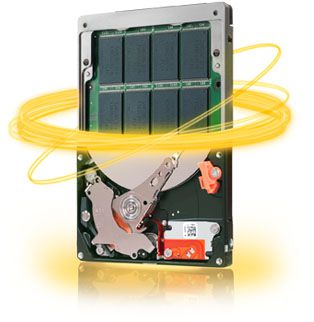- Qualcomm Launches Snapdragon 4 Gen 2 Mobile Platform
- AMD Launches Ryzen PRO 7000 Series Mobile & Desktop Platform
- Intel Launches Sleek Single-Slot Arc Pro A60 Workstation Graphics Card
- NVIDIA Announces Latest Ada Lovelace Additions: GeForce RTX 4060 Ti & RTX 4060
- Maxon Redshift With AMD Radeon GPU Rendering Support Now Available
Seagate Releases Second-Gen Momentus XT Hybrid Drive
It seems like every storage company today wants to jump on the “hybrid” bandwagon, but early last year, Seagate became one of the first to deliver a feasible solution, and it came in the form of the Momentus XT. A mobile drive, the Momentus XT set out to speed up laptops everywhere by including 4GB of SLC cache inside the hard drive that was used as a large cache to help improve the access speed of popular files – much like every other solution like this.
Since its launch, Seagate has shipped out over 1 million Momentus XT drives, which have gone out to end-users and also been pre-installed in machines from Dell, ASUS, Sony and so forth. Overall, Seagate has been pleased with the success of that drive, which leads us to the launch of the second-generation product here today, aptly called Momentus XT (yes, it’s the same).

Seeing a real future for this sort of drive, Seagate has been working on the second generation XT since the original launched, and as a result has rolled out three brand new features, FAST Boot, Adaptive Memory and FAST Management.
FAST Boot is interesting because it tackles a common problem of other hybrid solutions – that is, where a computer uptime might be so long, any potential caching of the boot process is lost. To make sure boots are kept always fast, a special location in the SLC NAND is reserved for just that purpose. It works by recording usage after POST completes and the OS boots to the desktop.
Adaptive Memory is essentially an improved algorithm to the original, where what the drive stores in the cache is picked out more carefully, to make sure that the drive as a whole is optimized. Finally, FAST Management is Seagate’s way of saying that the drive doesn’t require driver and that it self-learns.
We’ll save the more in-depth details for our review in a few weeks, but for the time-being we can make a couple of assumptions. At the current time, the Momentus XT is the most elegant solution on the market, for a simple reason: it’s convenient. It’s an all-in-one design that allows laptops (or even desktops) the ability to take advantage of this technology without needing a separate SSD and HDD. The downside of course is that we only have 8GB of flash storage to deal with, but as it’s SLC-based, it’s fast and long-lasting.
When we first learned of the Momentus XT about a month ago, its original projected price was much lower than the $245 that it sits at today. No doubt due in some part to the floodings in Thailand, it’s an unfortunate price-hike given good 160GB SSD offerings cost about the same or less. But, for those with real storage needs, SSDs are still out of the question.




